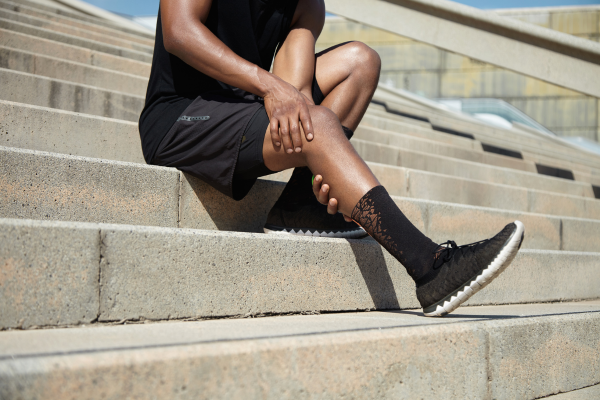It’s fair to say, nearly everyone will have suffered from a painful or stiff neck at one point in their lives. In fact, the World Health Organisation lists back and neck pain as one of the most common muscle or bone injuries, and the National Library of Medicine reported that 10-20% of adults experience symptoms of neck pain at any given time.
And while neck pain may go away on its own, it turns into chronic pain in 50% of cases. Catching neck pain before it reaches this stage can help prevent long-term pain, which can make getting a good night’s sleep tricky. But by making a few changes to the way you sleep, you can help improve your neck pain.
That’s why we’re going to explore which sleeping positions can help ease a stiff or sore neck.
What causes a stiff neck?
There are a multitude of things that can cause stiff neck, including (but not limited to)
- Lifting something heavy improperly
- Poor posture
- Sports/movement injury
- Muscle tension
- Fibromyalgia
- Whiplash
- A spinal cord injury
- A concussion
- Being overweight
- Smoking
Injuries or muscle tension can often be the cause of neck pain, but there are also certain medical conditions that can have neck pain as a side effect. For example, viral or bacterial infections can cause inflammation and swelling in your lymph nodes which can cause neck pain.
As is the same with most health conditions, neck and back pain is found to be more severe in people who smoke or are overweight, as excess weight can apply more pressure on the muscles.
How to prevent a stiff neck.
The best way to treat neck pain is to prevent it happening in the first place! Luckily, we’ve got some sure-fire ways to make sure neck pain doesn’t become a problem:
- Exercise regularly: you can alleviate muscle tension and stiffness through movement. Even gentle, low-impact exercises like walking, swimming, cycling or yoga can be useful.
- Change your pillow: a cheap/poor pillow and non-ergonomic mattress may be causing you more pain than you realise. A proper pillow and mattress can provide support for your neck and back muscles.
- Try to avoid carrying heavy bags: carrying a heavy bag on one shoulder can pull at your neck muscles, and even a heavy backpack (which evenly distribute the weight over both shoulders) can cause strain.
- Make sure you have a proper desk setup: There are certain steps you need to follow to ensure a proper ergonomic setup; making sure your screen is at eye level, your feet are flat on the floor, your arms are supported and shoulders not scrunched. Most importantly, your head should be directly above the neck, and not craning forward.
- Use your devices properly: Simple things like investing in headphones (so you’re not holding the phone between your shoulder and ear), and holding your phone or tablet at eye level to avoid tilting your neck for long periods of time can help prevent a stiff or sore neck.
How to relieve a stiff neck
But no matter what we do, sometimes you’ll move your head and jolt your muscles, injure yourself playing sports, or have an accident; sometimes neck pain is just unavoidable. So how can you relieve a stiff neck?
Apply heat/ice
Alternating between heat and ice on muscle strain in the neck can help provide relief; try applying a heat pad, taking a hot bath or applying an ice pack.
Stretch regularly
Gently and slowly, try stretching your neck muscles by moving your head from side to side, and rolling your shoulders back and forth. If the stretching causes pain, stop.
Acupuncture
Acupuncture is a form of traditional Chinese medicine, and involves putting needles into the body’s pressure points to relieve stress and tension; therefore, acupuncture can be a suitable method to ease stiffness and tension in the neck.
Consider seeking professional help
If you are suffering with long-term chronic pain, a doctor may refer you to an osteopath or physical therapist. Both can help you regain mobility and strength in your neck muscles following an injury or strain.
How to sleep with a stiff neck.
Finding a comfortable position to sleep in when you’re suffering from a sore neck can be tricky. Or perhaps it’s not your sleeping position that needs to change, but your pillow or mattress? Whatever it is, there are lots of different ways you can improve your quality of sleep.
Better sleeping positions
If you’re experiencing neck pain, the best positions to sleep are on your side or back, as these positions exert less pressure on the spine compared to sleeping on your stomach.
While changing your sleeping position can be challenging, try gradually adjusting to the new position over a few days. During the night, most people tend to move about, so consider having additional pillows within reach to prevent discomfort when shifting positions.
Improve your pillow and mattress
Mattresses and pillows that are either too firm or not supportive enough can cause problems with the neck when it comes to stiffness and pain. The alignment of the head, neck and back need to be correct when sleeping
A firmer, larger pillow may work well for side sleepers. Back sleepers may need a flatter pillow that supports the head and neck without forcing them into a forward position
Stretch before bed
We can experience pain because our muscles are tight or stiff from a tense or busy day. Consider lightly stretching before going to bed and again when you first wake up. Why not try:
- Rolling your shoulders back and down 10 times.
- Squeezing your shoulder blades together 10 times.
- Bringing each ear to your shoulders 10 times.
The best thing for a stiff neck? Carl Todd Clinics.
Getting a good nights sleep is important for your overall health, but a sore or stiff neck can greatly reduce your quality of sleep. By following the steps in this article, you can help improve your sleep quality, and reduce neck pain!
If you still have concerns about your neck, you can read more of our articles here or take a look at our website to see which treatments we offer.





